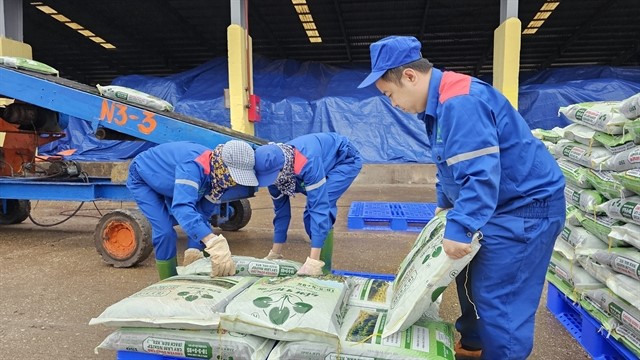The absence of VAT on fertilisers has prevented domestic producers from declaring and deducting input VAT, which leads to higher cost of domestically produced fertilisers, by an estimated 5-8 per cent, and makes them vulnerable in competition from imported fertilisers.

Domestic fertiliser producers expect that the amended Law on Value Added Tax (VAT) scheduled to be voted on in October will make fertilisers subject to a 5 per cent VAT rate to create a fairer market.
The absence of VAT on fertilisers for many years has prevented domestic producers from declaring and deducting input VAT, which leads to higher cost of domestically produced fertilisers, by an estimated 5-8 per cent, and makes them vulnerable in competition from imported fertilisers.
Việt Nam imports a significant amount of fertiliser every year, mostly from countries which impose VAT on fertiliser. This means that exporters will get input VAT tax refund when exporting to Việt Nam, allowing them to lower prices for competition.
Statistics of the General Department of Customs showed that Việt Nam imported nearly 4.12 million tonnes of fertilisers in 2023, worth US$1.41 billion, representing a rise of 21.3 per cent in volume but a fall of 12.8 per cent in value from 2022. Average import fertiliser price was at $342.9 per tonne in 2023, 28 per cent lower than a year ago.
Việt Nam imports fertiliser mainly from China and Russia, which together account for 60 per cent of the country’s import value.
Fertilisers are subject to 11 per cent VAT in China, which is proposed to be reduced to 9 per cent, and 20 per cent in Russia.
The Ministry of Finance said that with the imposition of VAT on fertilisers by exporting countries, exporters to Việt Nam will be refunded input VAT, allowing them to lower prices in Việt Nam.
Meanwhile, the current VAT law of Việt Nam does not impose VAT on fertilisers, meaning exporters don’t have to pay VAT and domestic producers cannot deduct input VAT.
This results in higher prices of domestically produced fertilisers than imported.
According to Lâm Thao Supe Chemical Company, the input VAT which cannot be deducted is included into production cost, accounting for around 2-3.4 per cent and increasing prices of the company’s products by 5-8.4 per cent, undermining their competitiveness in the domestic market.
The soaring fertiliser import forces domestic producers to narrow their scale, meaning that Việt Nam will be more dependent on imports. If global fertiliser prices increase, it will be a problem.
DAP No 2 – Vinachem said that as input VAT is not deducted, the company’s production cost increases by around VNĐ100 billion to VNĐ200 billion a year, which is included in the selling prices of products.
The company’s input VAT which is not deducted is estimated to total VNĐ808 billion from 2015 to the end of 2023.
In the latest draft of the amended Law on VAT, a 5 per cent VAT rate is proposed for fertilisers.
The law is scheduled to be passed at the eighth meeting of the National Assembly in October.
Seeking to expand export
While struggling to compete with imported fertilisers, domestic producers are seeking to expand export of many types which are in surplus such as urea nitrogen and super phosphate.
According to Phùng Hà, General Secretary of the Fertiliser Association of Việt Nam, the urea nitrogen production capacity of four plants is estimated at 3 million tonnes per year, while the domestic demand is only 1.6-1.8 million tonnes.
With super phosphate, the demand is at around 1 million tonnes per year, while the production capacity reaches more than 2 million tonnes.
It is necessary to promote export of these products to help producers avoid narrowing down their production, he said.
The association proposed export tax on urea be reduced from the current 5 per cent to zero to boost exports. — VNS





